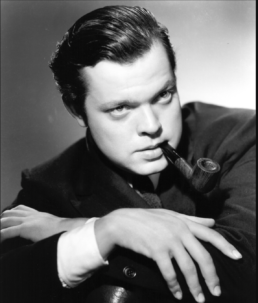These life stories may contain descriptions of childhood trauma and abuse, as well as images, voices and names of people now deceased. If you need help, you can find contact details for some relevant support services on our support page.
Renowned American filmmaker, Orson Welles (1915-1985), was in foster care as a child.
George Orson Welles was born in Kenosha, Wisconsin to businessman and inventor, Richard (Dick) Welles, and pianist, Beatrice Ives Welles. He was their second son.
At eighteen months of age, Orson Welles was identified by his parents’ medical friend, Maurice Bernstein, as a genius. Dr Bernstein—called Dadda by Orson—became a regular visitor to the home, and Orson his protégé.
When he was six, Orson’s parents separated. Three years later, his mother died of hepatitis.
Orson initially spent time travelling the world with his father (who increasingly succumbed to alcoholism), but then Dadda Bernstein organised for Orson to spend a year with a distinguished German psychologist who specialised in gifted children.
In Wisconsin, Orson boarded with the doctor and his wife and was enrolled in the local public school; there he caused an uproar by delivering an art lecture to the student body in which he lambasted his teachers for lacking creativity…
But the art lecture was far from his only public appearance in Wisconsin, where Herr Professor liked to exhibit Orson before psychology students who questioned him about his dreams. Taught by his mother that a child must always be entertaining, Orson shrewdly calculated what Herr Professor’s group would be interested to hear (Leaming, 17).
Orson fled from the German doctor after the latter made sexual advances and made his way to Dadda who was living in Chicago. His father then shipped eleven-year-old Orson off to boarding school, to the Todd Seminary for Boys in Woodstock, Illinois. At Todd, Orson made friends with teacher Roger (Skipper) Hill and his family.
On December 28, 1930, Richard Welles died. According to Dick’s will, fifteen-year-old Orson was to choose his guardian. He initially asked Skipper Hill, but Skipper declined and Orson moved in with Dadda Bernstein. He completed his final year at Todd and then travelled to Dublin where he successfully performed on stage.
After he returned to the US, Skipper Hill hired Orson as a drama teacher at Todd; he made his first film there. From 1935 Welles began appearing regularly on radio, and on stage for John Houseman’s productions.
National coverage from his radio and theatre work brought Welles to the attention of Hollywood. He signed a contract to make films with RKO Pictures in 1939. His first film project, based on Joseph Conrad’s novel, Heart of Darkness, never eventuated but in 1941 Citizen Kane appeared. Although not a financial success, Citizen Kane received nine Academy Award nominations, and Welles received three—for best actor, best director, and best original screenplay.
Orson Welles went on to make around fifteen feature films and a few short films, and he is widely regarded as one of the best film directors of all time. He also acted in more than fifty films.
References:
Barson, Michael. “Orson Welles. American Actor, Director and Writer.” Britannica. https://www.britannica.com/biography/Orson-Welles
Leaming, Barbara. Orson Welles. A biography. New York: Proscenium Publishers Inc, 1995.
Image available here.
